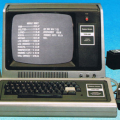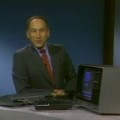BASIC Programs Over Shortwave
I ran across an interesting news article by Chris Brown in the July 1981 issue of 80 Microcomputing, titled “Dutch to Air BASIC Program.” From the article:
In what may be a first, an international shortwave broadcasting station will soon broadcast a machine readable computer program around the world.
On Sep. 10, the Dutch World Radio Service, Hilversum, Holland, intends to broadcast a brief BASIC program in computer ready, CLOADable form as part of a weekly science segment called “Media Network.” The show features microcomputers as its topic, and the BASIC program broadcast will be a housekeeping program. It will be broadcast in TRS-80, Apple and Pet compatible formats.
The broadcast may herald a new era in information exchange for microcomputerists. Should the reception of computer programs over the shortwave bands by listeners equipped with ordinary receivers turn out to be a straightforward process, the dissemination of software for popular microcomputers could take a large leap forward.
I wonder how this experiment turned out. It certainly didn’t “herald a new era in information exchange” so I suspect that shortwave was not a good medium for transmitting computer code. Here is another quote from later in the article:
According to Jonathan Marks, the producer of the Media Network show, similar experiments have been successfully been performed within Holland by the the Dutch domestic broadcasting service. A weekly program called “Hobbyscope” has used FM transmissions to broadcast several BASIC programs to its listeners.
I had heard of Hobbyscope (or Hobbyscoop) before in reference to Media Network, which was one of my favorite radio programs. I began listening to Media Network in the late 1980’s and continued listening until the show ended in October 2000. What’s funny is that I recall reading this 80 Microcomputing article back when it was published, but I didn’t remember that it referred to Media Network and Jonathan Marks, the show’s longtime producer and host.
Radio Netherlands Worldwide ended broadcasts on shortwave in 2012. After Jonathan Marks left Radio Netherlands, he set up his own company, Critical Distance, and writes the Critical Distance Weblog. He also created the Media Network Vintage Vault, where over 500 classic editions of Media Network are available for listening.












Simon N Goodwin says:
TRS-80 software was broadcast on FM and Medium Wave too, in the UK in December 1983.
At that time I was co-presenter of the ‘Computer Club’ on Radio Wyvern, at the time the only licenced Independent (i.e. non-BBC) Local Radio station for the counties of Herefordshire and Worcestershire in the English Midlands.
I programmed an animated ‘Christmas Card’ in BASIC for the TRS-80/Genie and Sinclair’s new ZX Spectrum and the station obtained permission to broadcast computer software, in the form of cassette interface beeps, after their normal 8pm curfew, directly following our weekly ‘Computer Club’ features and phone-in, produced by Rob Yarnold, later head of music at BBC Hereford and Worcester.
The 500 baud Tandy-format FM tape and the 1500 baud Sinclair programs were broadcast twice before Christmas. Several listeners reported that they were able to load them into their computers by recording off-air and replaying the tape into their micros. Not bad, considering that this was far from inevitable even for locally-made recordings!
I’d owned a Video Genie (EACA-made TRS-80 clone) since 1980 and was active in NATGUG, the UK National TRS-80 and Genie User Group and local computer clubs. I was also working for the three mainstream UK micro magazines (PC, PCW and CT).
That busy winter I also was on the production team of a local TV series (six half hour ‘Magic Micro Mission’ teatime children’s educatainment shows), made by Central ITV for broadcast in six TV regions, and had written a game (Gold Mine) for the Spectrum which went top 20 in the UK all-formats software chart.
The following year a Central ITV News crew interviewed me about how they felt the ‘home computer craze bubble had burst’, citing the collapse of Merseyside publisher Imagine and comparing micros with skateboards and hula hoops.
I demurred and the interview was not broadcast. But the TV and radio series' ceased to run. I moved off the Z80 and plied my trade on Sinclair’s 68K-based QL for a decade.
A quarter-century on I’m principal programmer in the Central Technology group at Codemasters Software company. The last game I worked on sold over 2 million copies worldwide. Some bubble.
If we were to try to broadcast GRID for PS3, Windows or Xbox360 in TRS-80 cassette format it would take around four years and require a C-1957341 cassette (let’s get a ‘C two million’ to be on the safe side ;-) to record the results. However the graphics would be a lot better than my 1983 lowres mono animation of Santa and his sleigh. :-)
((Great page BTW – found it linked from the System 80 pages in NZ; I showed off my Video Genie, still running TRS-80 games from 87.5K floppies, at last year’s Retro Fusion show. It’s still set up on the desk behind me now, though I1m typnig this on an Amiga 4000. I used Scripsit on the Genie to write software manuals and magazine articles for more than a decade. ))
David Sutherland says:
I have vague memories of reading magazine articles in the late 80’s or early 90’s about BASIC programs being transmitted over FM subcarrier. Never actually saw anything that worked but it always fascinated me.
rob yarnold says:
Good to read these memories and great to know you’re OK, Talking to Simon Goodwin here!! Good days… and how technology has moved on! I would never have thought I would be building web sites these days, they didn’t exist then, did they?
David Gunn says:
I remember this broadcast. My brother and I recorded it on cassette tape using his Sony CRF-5100 Shortwave radio. The program was called ‘BEAR," and it was an antenna aiming program. The software program was in fact broadcast in native TRS-80 CLOAD-able format. It was also broadcast in Apple ][ format. I think they broadcast the audio twice for both computers. I owned an Apple ][, and we used Model I TRS-80s at my High School. Despite having pretty good reception of the Radio Netherlands broadcast, I wasn’t able to get the program to load on either the TRS-80, or the Apple ][. I think the TRS-80 was blinking it’s two asterisks on the top-right-hand corner of the screen, but I eventually got an error.
I think I remember reading about the broadcast in the news section of Popular Electronics magazine.